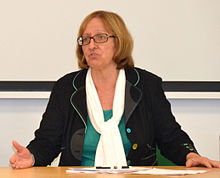Anne O'Garra
| Anne O'Garra FRS FMedSci | |
|---|---|
 | |
| Born | 1954 (age 66–67) |
| Website | http://www3.imperial.ac.uk/people/a.ogarra |
| Scientific career | |
| Thesis | Adhesion of coagulase negative staphyloccoci to human ephithelial cells (1983) |
| Website | www |
Anne O'Garra FRS FMedSci (born 1954)[1] is a British immunologist who has made important discoveries on the mechanism of action of Interleukin 10.[2][3]
O'Garra was born in Gibraltar.
Biography[]
From 1977 to 1980, Anne O'Garra studied at Chelsea College, University of London, and graduated with a B.Sc. (first class honours) in microbiology and biochemistry.[4]
At the National Institute for Medical Research (NIMR), she earned her Ph.D. in microbiology, staying on there for a four-year post-doctorate in immunology.
In 1987, O'Garra left England for Palo Alto, California, to work for the DNAX Research Institute, where by 2000 she had become a principal staff scientist in the department of immunobiology.[5] In 2001, she became the head of the Division of Immunoregulation at the Medical Research Council NIMR in London.[6] Since 2015, she has been an associate research director and group leader at the Francis Crick Institute, the successor institute to the NIMR.
Research[]
O'Garra is known for her contributions to the understanding of the intricate network of cell-cell and cytokine interactions regulating the induction and suppression of cellular immune responses. She was the first to discover the immunosuppressive functions of Interleukin-10 (IL-10), which inhibits antigen presentation by dendritic cells and macrophages and reduces their production of proinflammatory cytokines. She also discovered that dendritic cells produce the interleukin essential for activation of T-cells (IL-12) and subsequent eradication of intracellular pathogens and that IL-10 regulates this production.[7]
Awards and honors[]
She is a fellow of the Royal Society, the American Association for the Advancement of Science and the Academy of Medical Sciences. She is an honorary member of the British Society for Immunology.[8] In 2020 the International Cytokine and Interferon Society bestowed an Honorary Lifetime Membership Award on Anne O'Garra for her seminal and original contributions to the field. [9]
References[]
- ^ O'Garra, A. (24 December 2012). "Driving change in tuberculosis research: an interview with Anne O'Garra". Disease Models & Mechanisms. 6 (1): 6–8. doi:10.1242/dmm.011429. PMC 3529333. PMID 23268534.
- ^ "Anne O'Garra Profile" (PDF). Archived from the original (PDF) on 16 February 2012. Retrieved 24 July 2008.
- ^ Moore, Kevin W.; de Waal Malefyt, Rene; Coffman, Robert L.; O'Garra, Anne (2001). "Interleukin-10And Theinterleukin-10 Receptor". Annual Review of Immunology. 19 (1): 683–765. doi:10.1146/annurev.immunol.19.1.683. ISSN 0732-0582. PMID 11244051.
- ^ "Profile Anne O'Garra" (PDF). ENII. Archived from the original (PDF) on 16 February 2012. Retrieved 29 July 2013.
- ^ "ScienceWatch".
- ^ "National Institute for Medical Research". Archived from the original on 17 September 2009. Retrieved 19 July 2010.
- ^ "Royal Society New Fellows 2008".
- ^ "Honorary members | British Society for Immunology".
- ^ "ICIS 2020 Honorary Lifetime Membership Award bestowed on Anne O'Garra". International Cytokine & Interferon Society. 20 October 2020. Retrieved 24 October 2020.
- 1954 births
- Fellows of the Royal Society
- Female Fellows of the Royal Society
- Fellows of the Academy of Medical Sciences (United Kingdom)
- Gibraltarians
- Members of the European Molecular Biology Organization
- British immunologists
- Living people
- National Institute for Medical Research faculty
- Fellows of the American Association for the Advancement of Science
- Academics of the Francis Crick Institute